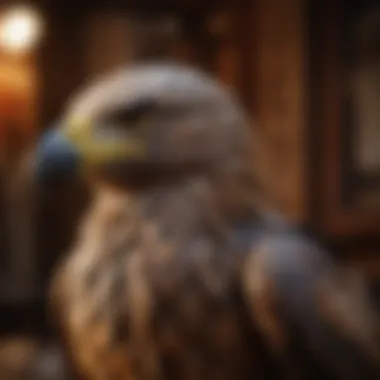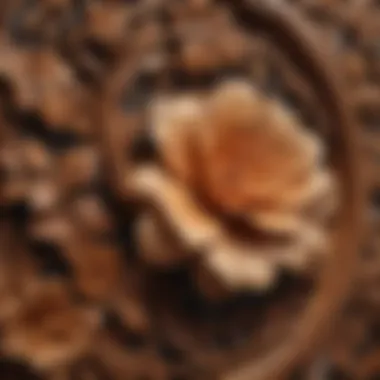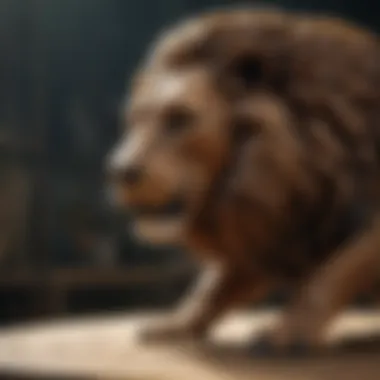Mastering the Art of Carving: A Deep Dive into the Craft of Carving All Day on One Piece


Techniques and Training
Being engrained in the art of carving all day on one piece mandates a profound understanding of advanced skills and techniques essential for mastery in this craft. This section will meticulously dissect the intricate maneuvers and methods required for precision and finesse in carving. Discover a range of training exercises and routines carefully curated to enhance one's strength, agility, and enduring stamina. Additionally, glean valuable insights from seasoned professionals, athletes, and trainers shedding light on the nuances that facilitate honing one's skills to perfection.
Safety and Risk Management
Within the realm of carving all day on one piece, prioritizing safety protocols and risk management strategies is paramount to mitigate potential hazards. Unveil the critical importance of adhering to stringent safety measures and precautions, safeguarding enthusiasts from unfortunate mishaps. Navigate through common risks inherent to this art form, equipping yourself with proactive strategies for risk reduction and comprehensive emergency preparedness protocols to ensure a secure carving experience.
Events and Competitions
Stay abreast of the pulse of the carving community through exclusive insights into upcoming events, prestigious competitions, and exhilarating championships that dominate the carving realm. Delve into captivating profiles featuring top-tier competitors and teams reigning in this craft, offering a glimpse into their journeys and accomplishments. Experience the thrill vicariously as you immerse yourself in a vivid recount of recent events and iconic highlights, capturing the essence of carving fervor and competitive zeal.
Lifestyle and Community
Embark on a riveting exploration into the lifestyle intricacies intertwined with the vibrant carving community culture. Unearth valuable tips on striking a harmonious balance between immersive carving pursuits and fostering a robust foundation of mental and physical well-being. Roam through insightful narratives that illuminate the symbiotic relationship between embracing extreme carving as a lifestyle and cultivating holistic wellness, enriching your understanding of this dynamic and exhilarating world.
Introduction
Carving all day on one piece is a meticulous art form that requires dedication, skill, and precision. In this article, we will delve into the intricate process of carving a single piece for an extended period. The focus will be on unraveling the essence of this craft, from selecting the perfect piece to mastering techniques that elevate the final carving to a masterpiece.
The Essence of Carving
Appreciating the Artistry
Carving all day on one piece demands an immense appreciation for the artistry involved. The painstaking process of shaping raw material into a work of art requires an eye for detail and a deep understanding of form and aesthetics. Appreciating the artistry in carving allows enthusiasts to capture the essence of their creativity in a tangible form, transcending mere craftsmanship to achieve artistic expression at its finest. While challenging, the artistry in carving offers a sense of accomplishment and fulfillment unparalleled by other endeavors, making it a popular choice among aficionados seeking a medium to channel their artistic vision.
The Tranquility of Carving
Amidst the noise of the world, carving provides a sanctuary of tranquility. The act of slowly whittling away excess material to reveal the hidden beauty within offers a sense of peace and calmness. The tranquility of carving lies not only in the physical act but also in the mental absorption it demands, immersing carvers in a state of focused serenity. Contrary to the hurried pace of modern life, carving all day on one piece allows individuals to experience a zen-like state where time slows down, and the mind finds solace in the rhythmic motions of carving tools.


The Therapeutic Nature
Beyond its artistic and tranquil aspects, carving all day on one piece harbors therapeutic qualities. The repetitive movements, combined with the tactile feedback of carving tools meeting wood, have a calming effect on the mind. The therapeutic nature of carving acts as a form of meditation, promoting mindfulness and reducing stress levels. Engaging in this meditative practice fosters mental clarity, emotional well-being, and a profound connection between the carver and their craft. Thus, the therapeutic benefits of carving extend beyond the physical creation to enrich the carver's overall quality of life.
Unveiling the Process
Selecting the Perfect Piece
At the core of carving all day on one piece lies the crucial task of selecting the perfect work material. Whether it be a block of wood, stone, or other mediums, the choice of material significantly influences the carving process and the final outcome. Selecting the perfect piece involves considering factors such as grain patterns, hardness, and suitability for the envisioned design. A meticulous approach to choosing the material ensures a harmonious relationship between the artist's vision and the inherent characteristics of the chosen piece, laying the foundation for a successful carving endeavor.
Analyzing the Grain
Grain analysis forms a fundamental aspect of carving all day on one piece, influencing the direction of cuts and the overall visual appeal of the final piece. Understanding the grain pattern of the chosen material is essential for determining how the carving tools interact with the surface, ensuring clean cuts and precise detailing. Analyzing the grain involves observing the natural patterns and textures within the material, identifying prominent features that can either enhance or pose challenges to the carving process. By studying and working in harmony with the grain, carvers can elevate the quality of their work and achieve a seamless integration of form and texture in their carvings.
Tools of the Trade
A carver's toolkit is their gateway to craftsmanship, with each tool serving a specific purpose in the carving process. Chisels and gouges are primary tools that aid in shaping and detailing the material, allowing for intricate designs and textures to emerge. Mallets and hammers provide the necessary force to drive the tools through the material, enabling carvers to achieve depth and dimension in their carvings. Sharpening essentials, such as sharpening stones and strops, are vital for maintaining the tools' keen edges, ensuring optimal carving performance. Understanding the function and proper use of these tools is crucial for aspiring carvers looking to hone their craft and create exceptional pieces that showcase both skill and artistry.
Diving into Detail
When we delve into the intricate art of carving all day on one piece, the section on Diving into Detail stands as a crucial pillar of understanding. It sheds light on the nuances that make this craft so mesmerizing and demanding. By focusing on the specific elements underpinning this process, enthusiasts can elevate their carving experience to new heights. Exploring this topic not only enhances one's technical prowess but also cultivates a deeper appreciation for the art of carving.
Mastering Techniques
Understanding Grain Direction
Understanding Grain Direction is a cornerstone technique in the realm of carving, guiding the artisan to unleash the full potential of their chosen material. By deciphering the natural orientation of grains within the material, carvers can strategically manipulate their tools for optimal results. Mastery of this technique not only enhances carving precision but also minimizes the risk of splintering or damage, ensuring a smooth artistic journey. Embracing Understanding Grain Direction can set carvers on a path towards honing their skills and unlocking new artistic avenues.
Precision and Patience
Precision and Patience are virtues revered in the world of carving, as they dictate the difference between a mediocre piece and a masterpiece. Carvers must approach their craft with meticulous attention to detail and unwavering patience, ensuring each incision serves a purpose in their artistic vision. By honing precision and cultivating patience, artisans can breathe life into their creations, imbuing them with depth and soul. These qualities not only contribute to the final aesthetic appeal but also shape the carver's mindset, fostering resilience and excellence in their work.


Creating Depth and Texture
Creating Depth and Texture is a multifaceted aspect of carving that elevates artworks from mere surfaces to captivating masterpieces. By skillfully manipulating tools to carve varying depths and textures, artisans can instill visual interest and tactile richness into their creations. This technique adds layers of complexity and sophistication to the artwork, inviting viewers to unearth new dimensions with every glance. Mastering the interplay between depth and texture allows carvers to evoke emotional responses, making each piece a testament to their craftsmanship and artistic finesse.
Exploring Tool Varieties
Chisels and Gouges
Chisels and Gouges serve as the backbone of a carver's toolkit, offering precision and versatility in shaping materials. These tools possess a unique characteristic in their ability to carve intricate details and smooth surfaces with finesse. Carvers rely on the sharp edges of chisels and gouges to sculpt intricate patterns and remove excess material with ease, making them indispensable companions in the carving journey. While they demand dexterity and skill to wield effectively, the advantages they offer in terms of control and refinement make them essential assets for any carving enthusiast.
Mallets and Hammers
Mallets and Hammers bring a compelling force to the art of carving, enabling carvers to apply controlled strength in shaping hard materials. Their key characteristic lies in their ability to deliver powerful blows without compromising precision, making them ideal tools for shaping stubborn surfaces. By utilizing mallets and hammers, carvers can achieve sculptural depth and structural integrity in their pieces, enhancing both aesthetic appeal and durability. However, mastering the art of balance between force and finesse is essential to harnessing the full potential of these impactful tools.
Sharpening Essentials
Sharpening Essentials are the unsung heroes of carving, as they ensure the longevity and performance of carving tools. The key characteristic of proper tool sharpening lies in maintaining razor-sharp edges that guarantee clean and precise cuts. By investing time and effort in sharpening essentials, carvers can elevate their craftsmanship by diminishing tool dullness and inefficiency. While the sharpening process demands patience and skill, its advantages in improving carving efficiency and overall quality are invaluable. Carvers who prioritize sharpening essentials can experience a marked difference in their carving experience, achieving cleaner cuts and finer details with ease.
Fine-Tuning the Craft
Embracing Challenges
Overcoming Clerkliness
The aspect of Overcoming Clerkliness is a cornerstone of the fine-tuning process in carving. This element focuses on the artist's ability to surpass the flaws and imperfections that may arise during the carving journey, highlighting the resilience and adaptability required to excel in this craft. The key characteristic of Overcoming Clerkliness lies in its transformative power, turning mistakes and obstacles into stepping stones for growth and learning. By embracing imperfections and challenges, artists can refine their skills and develop a critical eye for detail, making this approach a popular choice for those seeking mastery in the art of carving. Despite its challenges, the unique feature of Overcoming Clerkliness lies in its ability to instill resilience, patience, and a growth mindset in carvers, ultimately leading to improved craftsmanship in the long run.
Pushing Creative Boundaries
Pushing Creative Boundaries is an essential aspect of fine-tuning the craft of carving. This element encourages carvers to think beyond traditional techniques, explore innovative approaches, and innovate in their artistic process. The key characteristic of Pushing Creative Boundaries is its capacity to spark inspiration, foster creativity, and challenge carvers to break free from preconceived limitations. By pushing boundaries, artists can unlock new realms of imagination and expression, making it a beneficial choice for those looking to carve unique and distinctive pieces. The unique feature of Pushing Creative Boundaries lies in its potential to ignite passion, fuel artistic growth, and set carvers apart as visionary artisans in the competitive world of carving.


Learning from Mistakes
Learning from Mistakes plays a fundamental role in the fine-tuning journey of every carver. This aspect emphasizes the importance of accepting failures, extracting valuable lessons, and continuously evolving one's craftsmanship. The key characteristic of Learning from Mistakes is its ability to cultivate humility, resilience, and a growth-oriented mindset in artists, enabling them to transform setbacks into opportunities for improvement. Despite its challenges, this approach is a popular choice amongst seasoned carvers seeking to refine their skills and deepen their understanding of the carving process. The unique feature of Learning from Mistakes lies in its capacity to instill perseverance, adaptability, and self-awareness in carvers, fostering continuous growth and development in their artistic endeavors.
Sustaining Passion
Sustaining Passion is a critical aspect of the carving journey, ensuring that carvers remain motivated, inspired, and dedicated to their craft. This section delves into the intrinsic elements that fuel carvers' enthusiasm, offering insights into staying creatively engaged, seeking new sources of inspiration, and sharing expertise within the carving community. By exploring the dynamic nature of passion in carving, enthusiasts can rekindle their love for the craft, overcome challenges, and cultivate a supportive network of like-minded individuals.
Staying Motivated
Staying Motivated is key to sustaining one's carving passion. This aspect delves into the strategies and techniques that carvers can employ to maintain enthusiasm and focus throughout their artistic journey. By highlighting the importance of setting goals, celebrating small victories, and seeking feedback from peers, carvers can stay motivated and committed to their craft. The key characteristic of Staying Motivated is its ability to bolster resilience, creativity, and self-discipline in artists, making it a popular choice for those navigating the demanding yet rewarding world of carving. Despite its challenges, the unique feature of Staying Motivated lies in its capacity to reignite passion, drive continuous improvement, and foster a sense of achievement and fulfillment in carvers.
Seeking Inspiration
Seeking Inspiration is an integral part of sustaining passion in carving. This component explores the diverse sources of inspiration available to artists, ranging from nature and art history to personal experiences and cultural influences. By enriching their creative reservoirs and seeking out new ideas, carvers can infuse freshness and originality into their work. The key characteristic of Seeking Inspiration is its ability to ignite curiosity, stimulate creativity, and broaden artistic horizons, making it a valuable choice for those looking to break free from creative blocks and invigorate their carving practice. Despite its challenges, the unique feature of Seeking Inspiration lies in its capacity to spark innovation, nurture artistic growth, and foster a deep connection between carvers and their craft.
Sharing Expertise
Sharing Expertise plays a vital role in the carving community, fostering collaboration, knowledge exchange, and mentorship among artists. This aspect explores the benefits of sharing skills, insights, and experiences with fellow carvers, creating a supportive environment for learning and growth. By contributing to the collective wisdom of the carving community, carvers can strengthen their own abilities, gain new perspectives, and inspire others on their artistic journey. The key characteristic of Sharing Expertise is its power to cultivate camaraderie, generosity, and mutual respect among artists, making it a rewarding choice for those passionate about nurturing talent and fostering a sense of unity within the carving community. Despite its challenges, the unique feature of Sharing Expertise lies in its capacity to build lasting connections, amplify creativity, and enrich the artistic landscape with diverse perspectives and skills.
Achieving Mastery
Achieving mastery in the art of carving all day on one piece is a pinnacle that many enthusiasts aspire to reach. This section delves deep into the importance of continuous learning and skill development in honing one's craft. Obtaining mastery is not merely about technical proficiency but also embracing creative challenges and exploring diverse styles to push boundaries. Through continuous practice and dedication, carvers can elevate their artistry to new heights, garnering admiration and recognition within the carving community. The pursuit of mastery is a journey of self-discovery, resilience, and precision, requiring a steadfast commitment to excellence in every chisel stroke and gouge technique.
Continuous Learning
Experimenting with Styles
Experimenting with styles is a fundamental aspect of honing carving skills and refining one's artistic expression. By exploring various styles, from traditional to contemporary approaches, carvers can broaden their creative horizons and develop a signature aesthetic. This experimentation enhances adaptability and versatility, enabling carvers to tackle diverse projects with innovative techniques and fresh perspectives. Embracing different styles fosters a deeper understanding of the art form and cultivates a unique artistic voice, setting carvers apart in a competitive landscape.
Attending Workshops
Attending workshops serves as a dynamic platform for carvers to immerse themselves in hands-on learning experiences, guided by seasoned professionals and artists. These workshops offer invaluable insights, demonstrations, and feedback to enhance technical skills and foster a supportive community of like-minded individuals. Networking opportunities abound at workshops, enabling carvers to connect with industry experts, exchange ideas, and gain inspiration from diverse perspectives. The collaborative environment of workshops nurtures creativity and provides a nurturing space for continuous growth and skill development.
Networking with Carving Enthusiasts
Networking with carving enthusiasts is a cornerstone of professional growth and community engagement in the carving world. Building connections with fellow carvers, artisans, and collectors facilitates knowledge sharing, collaboration on projects, and exposure to new trends and techniques. Engaging with a vibrant network of carving enthusiasts broadens horizons, instills a sense of camaraderie, and offers opportunities for collaboration and creative exchange. Networking not only expands one's professional circle but also fuels motivation, creativity, and passion for the craft, creating a dynamic ecosystem of support and inspiration.















